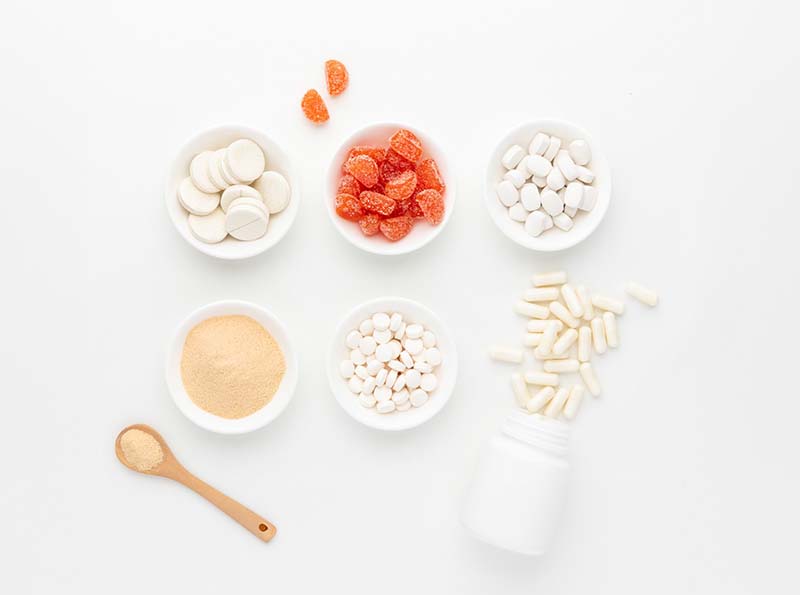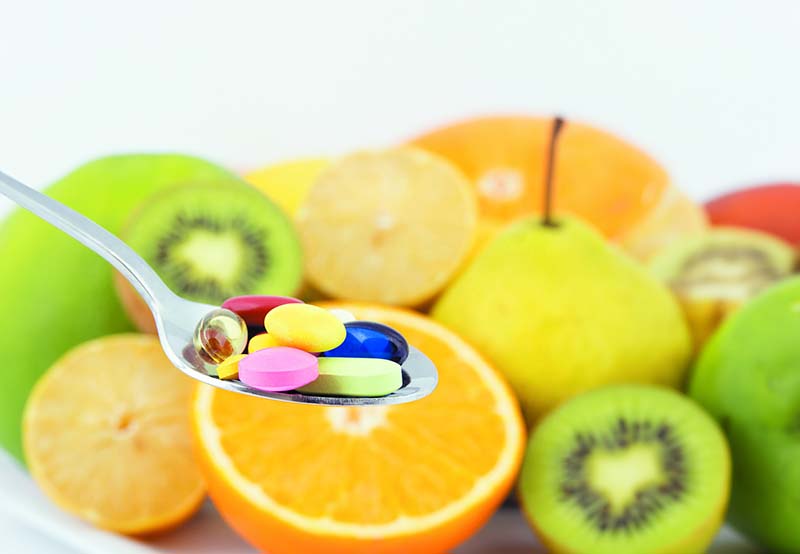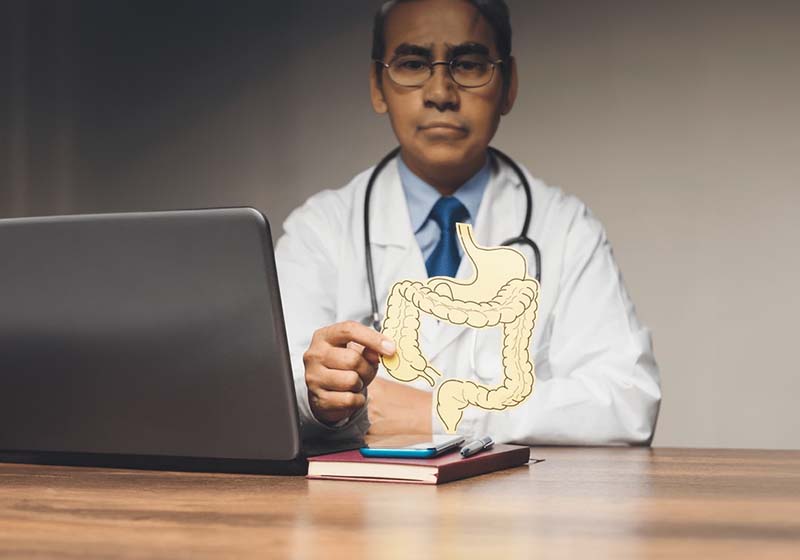“Can Vitamin C Cause Constipation?” is a common question when discussing Vitamin C, a nutrient renowned for its immune-boosting abilities. However, the accuracy of this belief warrants a thorough examination. Let’s explore some lesser-known facets of Vitamin C that might surprise you.
1. The Role of Vitamin C in the Body
Vitamin C is a super helpful nutrient for your body. It’s famous for making your immune system strong, helping you fight off illnesses. But Vitamin C does much more than that. It’s an important part of neutrophils, which are like your body’s soldiers that fight off bad germs.
Vitamin C is also great for people who have trouble with their lungs or sinuses, especially when the seasons change. It helps keep your breathing areas healthy. Plus, it’s good for your adrenal glands – these are small glands that help your body handle stress. Having enough Vitamin C means your body can better manage stress.
This vitamin is also a big help in letting your body use iron from foods, which keeps your energy levels up and helps prevent iron deficiency. And it’s super important for making collagen, which is like the building block for healthy skin, hair, nails, and joints. With enough Vitamin C, your skin can look better, and your joints can feel stronger.
There’s also some new research that suggests Vitamin C might be really important for your brain, helping you think and remember things better.
Note: To get all these benefits, try to eat lots of foods that have Vitamin C, like oranges, strawberries, bell peppers, and spinach. If you’re thinking about taking Vitamin C pills, it’s a good idea to talk to a doctor first, especially if you have other health conditions or take other medicines.

2. The Connection Between Vitamin C and Digestive Health
Vitamin C, known scientifically as ascorbic acid, is more than just an immune booster; it’s a key player in digestive health. Research has shown that Vitamin C can stimulate the production of digestive acids like pepsin, which are essential for breaking down food in the stomach. Additionally, the organs in our digestive system rely heavily on collagen for their structure and function. Since Vitamin C is crucial for collagen production, it indirectly supports the health and integrity of these digestive organs.
Another important aspect of Vitamin C’s role is its contribution to the gut barrier’s function. This barrier is vital in preventing harmful substances, like endotoxins, from escaping the gut and causing trouble in other parts of the body. Given the complexity of the digestive system, Vitamin C’s influence is multifaceted. For instance, one study highlighted Vitamin C’s connection with maintaining healthy blood glucose levels, showcasing its broad impact on our digestive health.

2.1 How Vitamin C Affects Digestion
Vitamin C is essential for a well-functioning digestive system. Our stomach needs hydrochloric acid to properly break down food, and this acid is so strong it could even damage materials like your shoes! Vitamin C plays a critical role in the production of this acid. A deficiency in Vitamin C can lead to a decrease in hydrochloric acid production, which might result in uncomfortable digestive symptoms like burping, flatulence, and heartburn. Ensuring you get enough Vitamin C can significantly improve your digestion, helping you avoid these common discomforts.
2.2 Vitamin C and Gut Health
Vitamin C’s impact on gut health is significant, especially concerning the gut microbiota – the community of microorganisms living in our intestines. Several studies have shown that high doses of Vitamin C supplementation can change the bacterial populations in the gut. Notably, it increases the presence of beneficial bacteria like Bifidobacterium. These changes suggest that Vitamin C can play an important role in promoting a healthy gut microbiome. A well-balanced gut microbiome is crucial for overall health, influencing everything from digestion to immune function.
Notes:
- Including Vitamin C-rich foods in your diet, such as citrus fruits, bell peppers, and leafy greens, is a simple way to support your digestive health.
- If considering Vitamin C supplements, it’s wise to consult with a healthcare provider, as high doses can affect individuals differently.
3. Can Vitamin C Cause Constipation? Unraveling the Truth
The belief that Vitamin C causes constipation is widespread yet largely unfounded. It’s true that in some cases, Vitamin C can lead to constipation. This vitamin acts as an osmotic laxative, meaning it draws water into the intestines. While this can sometimes result in loose stools, it can conversely lead to constipation if the stool becomes overly hard and challenging to pass. It’s crucial to note, however, that Vitamin C itself isn’t a laxative. Interestingly, lower levels of Vitamin C might be associated with constipation.

3.1 Studies on Vitamin C and Constipation
Vitamin C’s role in alleviating constipation isn’t direct, but it contributes significantly to digestive health. Constipation is a prevalent digestive problem stemming from various causes, such as a diet low in fiber, insufficient physical activity, and not drinking enough water. As an antioxidant, Vitamin C bolsters a healthy immune system and provides protection against cellular damage.
Note: Increasing your water intake when consuming Vitamin C supplements can help mitigate constipation risks.
3.2 Personal Experiences and Anecdotal Evidence
Constipation is rarely listed as a side effect of Vitamin C, but it can occur, particularly with high doses.
Accounts vary regarding Vitamin C and constipation. Some individuals report constipation after consuming large doses of Vitamin C supplements. This may result from the body’s response to a sudden high intake, impacting the digestive system.
However, it’s important to understand that these experiences are subjective and differ widely. Factors like personal health conditions, diet, and lifestyle play a significant role in how one’s body responds to Vitamin C supplements.
Note: Balancing Vitamin C intake with a fiber-rich diet can help in maintaining regular bowel movements.
4. Other Potential Side Effects of Vitamin C
Taking Vitamin C supplements, especially in high doses or when used incorrectly, can lead to several side effects. These include stomach pain, heartburn, nausea, vomiting, and diarrhea. It’s important to be aware that immune-boosting products often contain high doses of Vitamin C and, while generally safe, they can sometimes function as a laxative.
Vitamin C is known to increase gastric motility, which accelerates digestion and moves contents through the system more rapidly. Consequently, your immune supplement might be the culprit behind any diarrhea episodes.

4.1 Overconsumption of Vitamin C: Risks and Symptoms
For adults, the recommended dietary allowance (RDA) of Vitamin C is 90 milligrams (mg) for males and 75 mg for females. Exceeding 2,000 mg per day can lead to adverse effects. The common mild side effects from too much Vitamin C encompass:
- Diarrhea
- Nausea
- Stomach cramping
- Bloating
- General abdominal discomfort
Note: Monitoring your intake of Vitamin C, especially when consuming multiple supplements, is crucial to avoid these side effects.

4.2 Safe Dosage of Vitamin C
The RDA for Vitamin C is designed to satisfy the nutrient requirements of 97–98% of healthy individuals across different gender and age groups. Adhering to these guidelines is key to ensuring safe and effective use of Vitamin C.
| Life stage | RDA |
| Kids (1–3 years) | 15 mg |
| Kids (4–8 years) | 25 mg |
| Adolescents (9–13 years) | 45 mg |
| Teens (14–18 years) | 65–75 mg |
| Adult women (aged 19 and older) | 75 mg |
| Adult men (aged 19 and older) | 90 mg |
| Pregnant women (aged 19 and older) | 85 mg |
| Breastfeeding women (aged 19 and older) | 120 mg |
Note: When choosing Vitamin C supplements, look for products that clearly state their Vitamin C content and compare it with the RDA to ensure you’re within safe limits. Remember, a balanced diet typically provides sufficient Vitamin C, so supplements should only be used when necessary.

5. Preventing and Treating Constipation
Constipation, while uncomfortable, can often be managed with straightforward lifestyle modifications. Here are some prevention tips:
- Increase Fiber Intake: Incorporating fiber-rich foods such as fruits, vegetables, and whole grains is essential for improving gut function. If you’re sensitive to certain foods, avoid high-fructose fruits like apples, pears, and watermelon, which can cause gas.
- Exercise Regularly: Staying active helps keep stool moving through the colon.
- Stay Hydrated: Aim for eight glasses of water daily and limit caffeine, as it can lead to dehydration.
Effective Constipation Treatments
- Review Medications and Supplements: If you suspect that certain medicines or supplements are causing constipation, consult with your doctor. They may adjust the dosage or recommend an alternative. Always seek professional advice before changing or stopping any medication.
- Over-the-Counter Medicines: Your doctor may suggest a laxative for temporary relief. They will recommend the best type for your situation, including:
- Fiber supplements (e.g., Citrucel, FiberCon, Metamucil)
- Osmotic agents (e.g., Milk of Magnesia, Miralax)
- Lubricants, like mineral oil (e.g., Fleet)
- Stimulants (e.g., Correctol, Dulcolax) – use only for severe constipation or when other treatments fail.
- Bowel Training: Your doctor might recommend bowel training, aiming for a bowel movement at the same time each day. Trying after breakfast can be effective as eating stimulates colon movement.

5.1 Dietary Changes for Constipation Relief
To alleviate constipation, modify your diet by avoiding low-fiber foods like chips, fast food, meat, some frozen meals, and processed foods like hot dogs or certain microwavable dinners.
To treat constipation, include these in your diet:
- Fiber: Adults should aim for 22 to 34 grams of fiber daily. Good sources include whole grains (whole wheat bread and pasta), fruits (berries, apples with skin, oranges, pears), and vegetables (carrots, broccoli, green peas, collard greens).
- Hydration: Drink plenty of water and other liquids, such as fruit and vegetable juices and clear soups, to enhance fiber’s effectiveness, softening stools and easing passage.
Note: Older adults may need to be more mindful of their fiber intake, as interest in food can decrease with age.

5.2 When to Seek Medical Help
Seek medical attention if constipation is accompanied by severe abdominal pain, blood in the stool, unintended weight loss, or a sudden onset of constipation. These symptoms could indicate a more serious health issue.

6. Conclusion
Navigating the complexities of how Vitamin C impacts our digestive system reveals a diverse range of experiences and insights. The interplay between Vitamin C intake and constipation illustrates the importance of understanding our bodies’ unique reactions to supplements. We encourage you to share your personal experiences and feedback on this topic. Your contributions are not only valuable to us at Biosculpture but also to others navigating similar health journeys. For more enlightening discussions and expert insights, be sure to delve into our other blogs at Biosculpture, where we continuously explore the fascinating world of health and wellness.


